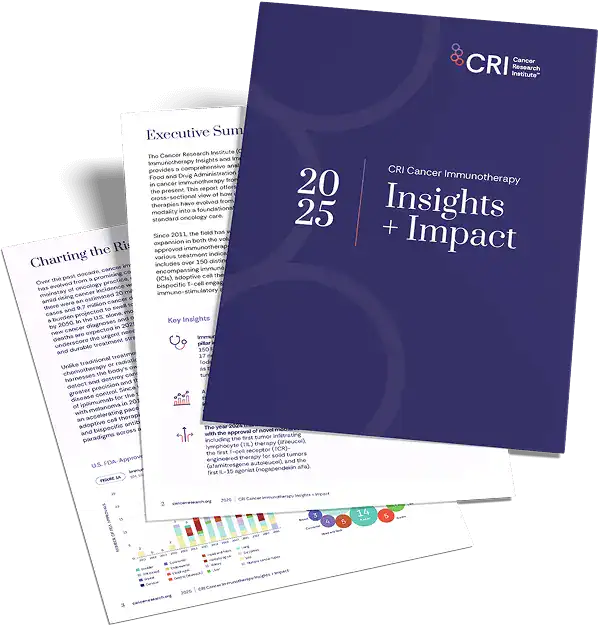CRI Technology Impact Award
Turning Bold Visions into Breakthroughs in Cancer Immunotherapy
LOI Deadline
November 15, 2025
Invited Full Proposal Deadline
March 13, 2026
Program Overview
The CRI Technology Impact Award is designed to support early-stage, pre-development concepts — innovations that have not yet been built or tested, but that hold the potential to transform the landscape of cancer immunotherapy.
Focus and Scope
The CRI Technology Impact Award aims to bridge the gap between conceptual technological innovation and real-world clinical application. By encouraging collaboration between technology
developers and clinical cancer immunologists, CRI hopes to accelerate the creation of technologies that can generate proof-of-principle data and unlock novel biological insights.
Technology Impact Awards are not intended to fund the continuation or refinement of existing technologies. Instead, they support visionary, high-risk/high-reward ideas that could lay the groundwork for a new generation of tools, platforms, and systems capable of overcoming the most critical barriers in the field. Proposals that fundamentally apply existing technologies (e.g. scSeq, spatial seq, etc.) without substantial instrumentation, device, or algorithm development will typically be considered non-responsive.
The most competitive applicants will propose innovations that address areas where technological advancement can have the greatest impact on cancer immunotherapy and patient outcomes. Such technologies may include, but are not limited to:
- Computational systems biology approaches to analyze large-scale datasets, develop more accurate models of underlying cellular and molecular networks, with the goal of better explaining and predicting response/resistance to cancer therapy
- Advanced cancer (or molecular) profiling technologies that can be used to identify key barriers to immunotherapy and improve target identification and therapeutic decision-making
- Real-time visualization technologies that allow tracking of molecular and cellular immune responses to treatment in mice or humans
- Complex multicellular culture systems that model interactions between tumor and the immune system and enable therapeutic testing or mechanistic studies
- Novel therapeutic technologies that promise to safely and effectively promote tumor immunity in new ways
Proposals will be evaluated based on novelty, creativity, technical sophistication, and most importantly, their transformative potential to shape the future of cancer immunotherapy. The CRI Technology Impact Award does not support clinical trials, though samples collected as part of independently funded clinical trials can be used if appropriate for technology development. For clinical trial support refer to the CRI Clinical Innovator.
Ultimately, the CRI Technology Impact Award invests in innovation at its earliest and most uncertain stage — with the goal of accelerating the discovery of disruptive technologies that can drive the next wave of effective, personalized, and durable cancer immunotherapies. By funding what doesn’t yet exist, we aim to help create the tools and insights that will lead to breakthroughs for patients worldwide.
Financial Support
Technology Impact Awards provide seed funding of up to $600,000 over 2-4 years to ignite the development of entirely new technologies that harness the immune system to detect, understand, and treat cancer.
Institutions will be provided indirect costs of up to 10% of the total amount awarded. Indirects are provided in addition to awarded funds.
Eligibility
Applicants must hold a tenure-track position at a not for profit research center or institution. Clinical cancer immunologists and technology developers are encouraged to collaborate. Co-PIs are eligible and encouraged to apply.
Deadlines
The process for applying for a CRI Technology Impact Award consists of two parts:
- Letter of Intent
- Invited Application
The deadline for the receipt of the Letter of Intent is November 15. Candidates will be notified by mid-February whether they have been invited to submit a full grant proposal. The full application is due March 13. If these deadlines fall on the weekend, applications will be accepted the following Monday. Applications are due by 11:59 p.m. Eastern Time on these dates. The earliest an award can activate is July 1. Awards activate on the first of the month.
Instructions for Applying
Letters of intent must be submitted electronically. Once you access the application, you will be asked to create a user account unique to you, which will catalogue all applications you submit to CRI. If you have submitted a grant application to CRI in the past, please login with your existing user account.
Supporting Materials
After you have filled out all required fields on the online form, you will be asked to upload the following five items as individual PDF documents.
- An initial research concept (succinct description of the proposed research plan with specific aims and timelines, description of how the proposed technology platform has the potential to transform the field of cancer immunotherapy), not to exceed 3 pages
- Brief description of your current research.
- Curriculum vitae
- Bibliography (limit bibliography to past 5 years or publications relevant to proposed research)
- If applicable, curriculum vitae for all group members, as well as a description of each member’s research focus
Notes:
- Applications exceeding stated page limits will be disqualified.
- Only PDF documents will be accepted. All files must be submitted individually on the attachments page of the online application.
- When you have finished uploading the attachments, click “Submit.” You will receive a notice confirming that you have successfully submitted your Application Form. Immediately after, an automated notification from CRI will be sent to your email address, also confirming submission. If you encounter problems uploading your attachments, email them to [email protected]. Be sure to note the application number, which will be assigned to you at the time of submission.
- Online applications will be accepted until 11:59 p.m. Eastern Time on the deadline date. If the deadline falls on the weekend, applications will be accepted until the end of day that following Monday. We strongly suggest submitting your applications as early as possible to provide ample time in case your application is incomplete. Incomplete applications will not be considered.
- Formatting Guidelines: Any documents you attach to your online application form must be typed single-space using a 12 point or larger font size.
Application Resources
Meet 2025 Awardee Ayano Kohlgruber, PhD
Boston Children’s Hospital

Dr. Kohlgruber is investigating the underlying biological mechanism that causes immune checkpoint inhibitor-induced arthritis in cancer patients.
What’s Next in Immunotherapy?
Read CRI’s 2025 Cancer Immunotherapy Insights + Impact Report
